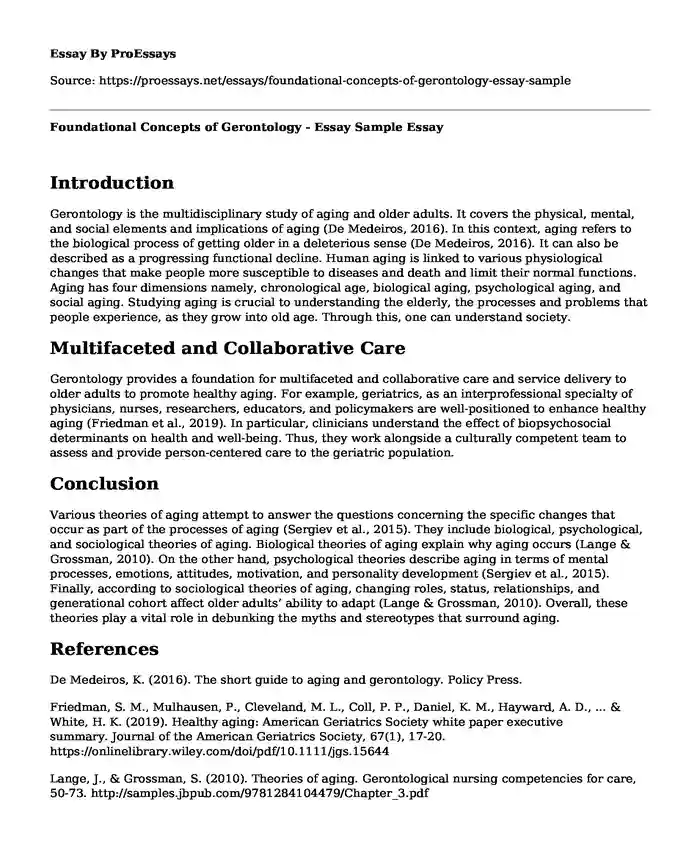Introduction
Gerontology is the multidisciplinary study of aging and older adults. It covers the physical, mental, and social elements and implications of aging (De Medeiros, 2016). In this context, aging refers to the biological process of getting older in a deleterious sense (De Medeiros, 2016). It can also be described as a progressing functional decline. Human aging is linked to various physiological changes that make people more susceptible to diseases and death and limit their normal functions. Aging has four dimensions namely, chronological age, biological aging, psychological aging, and social aging. Studying aging is crucial to understanding the elderly, the processes and problems that people experience, as they grow into old age. Through this, one can understand society.
Multifaceted and Collaborative Care
Gerontology provides a foundation for multifaceted and collaborative care and service delivery to older adults to promote healthy aging. For example, geriatrics, as an interprofessional specialty of physicians, nurses, researchers, educators, and policymakers are well-positioned to enhance healthy aging (Friedman et al., 2019). In particular, clinicians understand the effect of biopsychosocial determinants on health and well-being. Thus, they work alongside a culturally competent team to assess and provide person-centered care to the geriatric population.
Conclusion
Various theories of aging attempt to answer the questions concerning the specific changes that occur as part of the processes of aging (Sergiev et al., 2015). They include biological, psychological, and sociological theories of aging. Biological theories of aging explain why aging occurs (Lange & Grossman, 2010). On the other hand, psychological theories describe aging in terms of mental processes, emotions, attitudes, motivation, and personality development (Sergiev et al., 2015). Finally, according to sociological theories of aging, changing roles, status, relationships, and generational cohort affect older adults’ ability to adapt (Lange & Grossman, 2010). Overall, these theories play a vital role in debunking the myths and stereotypes that surround aging.
References
De Medeiros, K. (2016). The short guide to aging and gerontology. Policy Press.
Friedman, S. M., Mulhausen, P., Cleveland, M. L., Coll, P. P., Daniel, K. M., Hayward, A. D., ... & White, H. K. (2019). Healthy aging: American Geriatrics Society white paper executive summary. Journal of the American Geriatrics Society, 67(1), 17-20.
https://onlinelibrary.wiley.com/doi/pdf/10.1111/jgs.15644
Lange, J., & Grossman, S. (2010). Theories of aging. Gerontological nursing competencies for care, 50-73. http://samples.jbpub.com/9781284104479/Chapter_3.pdf
Sergiev, P. V., Dontsova, O. A., & Berezkin, G. V. (2015). Theories of aging: an ever-evolving field. Acta Naturae (angloiazycnaia versiia), 7(1 (24)).
https://cyberleninka.ru/article/n/theories-of-aging-an-ever-evolving-field.
Cite this page
Foundational Concepts of Gerontology - Essay Sample. (2024, Jan 08). Retrieved from https://proessays.net/essays/foundational-concepts-of-gerontology-essay-sample
If you are the original author of this essay and no longer wish to have it published on the ProEssays website, please click below to request its removal:
- Project Report Sample on Confirming Physical and Electrical Characteristics of the Installed Transformer
- Childhood Trauma and Criminal Behavior: An Annotated Bibliography
- Fractional Distillation Report Example
- Napkin Ring Problem Analysis
- Social Development Case Study
- Postpartum Depression Caused by Domestic Violence Paper Example
- Essay Sample on Children With Attention Deficit Disorder







